|
Books Should Be Free Loyal Books Free Public Domain Audiobooks & eBook Downloads |
|
|
Books Should Be Free Loyal Books Free Public Domain Audiobooks & eBook Downloads |
|
Philosophy Books |
|---|
|
Book type:
Sort by:
View by:
|
By: John Charlton Hardwick | |
|---|---|
 Religion and Science from Galileo to Bergson
Religion and Science from Galileo to Bergson
This history of Western philosophy, published in 1920, explores the ways mankind has explained the natural world during the last few centuries, whether by spiritual interpretation or through advances in science. From the Preface: "The chapters which follow are not intended as even a slight sketch of the history of Thought since the Renaissance. Their object is more modest, i.e. to illustrate the thesis that mankind, being 'incurably religious,' insists (however hopeless the enterprise may sometimes seem) upon interpreting the universe spiritually." | |
By: John Cowper Powys (1872-1963) | |
|---|---|
 The Complex Vision
The Complex Vision
| |
By: John Crombie Brown (-1879?) | |
|---|---|
 The Ethics of George Eliot's Works
The Ethics of George Eliot's Works
| |
By: John Dee (1527-1608) | |
|---|---|
 The Mathematicall Praeface to Elements of Geometrie of Euclid of Megara
The Mathematicall Praeface to Elements of Geometrie of Euclid of Megara
| |
By: John Dewey (1859-1952) | |
|---|---|
 Democracy and Education: an introduction to the philosophy of education
Democracy and Education: an introduction to the philosophy of education
| |
 Essays in Experimental Logic
Essays in Experimental Logic
In this early collection of formative essays, acclaimed American philosopher John Dewey argues that the idealistic, realistic, and analytic schools of philosophy fail to take into account the pragmatic and experimental nature of experience - common to science and practical experience, but alien to the abstract theorizing of coherentist and correspondence theories of logic. Here we find the essential groundwork for the mature naturalistic and process-oriented metaphysics that Dewey would elaborate in his later mature works such as Experience and Nature and Logic: The Theory of Inquiry... | |
 Human Nature And Conduct - Part 1, The Place of Habit in Conduct
Human Nature And Conduct - Part 1, The Place of Habit in Conduct
John Dewey, an early 20th Century American philosopher, psychologist, educational theorist saw Social Psychology as much a physical science as Biology and Chemistry. This project encompasses Part 1 of 4 of his book Human Nature and Conduct. Dewey's uses the word "HABIT" as a specialized catch-all word to describe how a person and his/her objective environment interact. This interaction is the basis for moral judgement. Dewey writes: "All habits are demands for certain kinds of activity; and they constitute the self.” In other places he also asserts that "Habits are Will." - Summary by William Jones, Soloist | |
By: John Fiske (1842-1901) | |
|---|---|
 The Destiny of Man Viewed in the Light of His Origin
The Destiny of Man Viewed in the Light of His Origin
| |
By: John Galsworthy (1867-1933) | |
|---|---|
 Studies and Essays: Censorship and Art
Studies and Essays: Censorship and Art
| |
By: John Graham Brooks (1846-1938) | |
|---|---|
 The Conflict between Private Monopoly and Good Citizenship
The Conflict between Private Monopoly and Good Citizenship
| |
By: John H. Young | |
|---|---|
 Our Deportment Or the Manners, Conduct and Dress of the Most Refined Society
Our Deportment Or the Manners, Conduct and Dress of the Most Refined Society
| |
By: John Harvey Kellogg (1852-1943) | |
|---|---|
 Plain Facts for Old and Young
Plain Facts for Old and Young
| |
By: John McGovern (1850-1917) | |
|---|---|
 The Golden Censer Or, the duties of to-day, the hopes of the future
The Golden Censer Or, the duties of to-day, the hopes of the future
| |
By: John Morley (1838-1923) | |
|---|---|
 Diderot and the Encyclopædists (Vol 1 of 2)
Diderot and the Encyclopædists (Vol 1 of 2)
| |
 Diderot and the Encyclopædists Volume II.
Diderot and the Encyclopædists Volume II.
| |
By: John Ruskin (1819-1900) | |
|---|---|
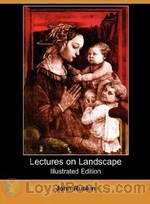 Lectures on Landscape
Lectures on Landscape
A series of lectures on landscape painting delivered at Oxford in 1871, by artist, critic, and social commentator, John Ruskin. | |
 The Ethics of the Dust
The Ethics of the Dust
| |
By: John S. C. Abbott (1805-1877) | |
|---|---|
 The Child at Home The Principles of Filial Duty, Familiarly Illustrated
The Child at Home The Principles of Filial Duty, Familiarly Illustrated
| |
By: John Stuart Mill (1806-1873) | |
|---|---|
 On Liberty
On Liberty
Published in 1859, On Liberty is a libertarian philosophical work by English philosopher John Stuart Mill that endorses his view on the importance of individuality for the constant progression and improvement of society. The work also supports economic and moral freedom, and openly criticizes the influence of social authority that in one way or another imposes a predefined set of acceptable attitudes and opinions. Highlighting issues including the incongruity between authority and liberty, the oppressive... | |
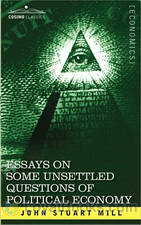 Essays on Some Unsettled Questions of Political Economy
Essays on Some Unsettled Questions of Political Economy
This is Mill’s first work on economics. It foreshadows his Political Economy which was the standard Anglo-American Economics textbook of the late 19th and early 20th centuries. Mill’s economic theory moved from free market capitalism, to government intervention within the precepts of Utilitarianism, and finally to Socialism. | |
 Utilitarianism
Utilitarianism
John Stuart Mill’s book Utilitarianism is one of the most influential and widely-read philosophical defenses of utilitarianism in ethics. The essay first appeared as a series of three articles published in Fraser’s Magazine in 1861; the articles were collected and reprinted as a single book in 1863. It went through four editions during Mill’s lifetime with minor additions and revisions. Although Mill includes discussions of utilitarian ethical principles in other works such as On Liberty and The Subjection of Women, Utilitarianism contains Mill’s only major discussion of the fundamental grounds for utilitarian ethical theory. | |
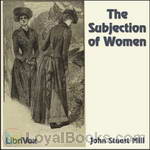 The Subjection of Women
The Subjection of Women
The Subjection of Women is the title of an essay written by John Stuart Mill in 1869, possibly jointly with his wife Harriet Taylor Mill, stating an argument in favor of equality between the sexes. It offers both detailed argumentation and passionate eloquence in opposition to the social and legal inequalities commonly imposed upon women by a patriarchal culture. Just as in “On Liberty,” Mill defends the emancipation of women on utilitarian grounds, convinced that the moral and intellectual advancement of women would result in greater happiness for everybody. | |
 Considerations on Representative Government
Considerations on Representative Government
Mill's volume was published in 1861 as an argument favoring this form of governance. Mill covers what forms of government work best, including when representative government is applicable and when not. He details appropriate functions of representative bodies and warns of problems to avoid. He distinguishes between true and false democracy. Other areas covered include how voting is carried out, the role of a second chamber in Parliament, and how an executive branch might function. | |
 Auguste Comte and Positivism
Auguste Comte and Positivism
Part 1 lays out the framework for Positivism as originated in France by Auguste Comte in his Cours de Philosophie Positive. Mill examines the tenets of Comte's movement and alerts us to defects. Part 2 concerns all Comte's writings except the Cours de Philosophie Positive. During Comte's later years he gave up reading newspapers and periodicals to keep his mind pure for higher study. He also became enamored of a certain woman who changed his view of life. Comte turned his philosophy into a religion, with morality the supreme guide. Mill finds that Comte learned to despise science and the intellect, instead substituting his frantic need for the regulation of change. | |
By: John Tulloch (1823-1886) | |
|---|---|
 Pascal
Pascal
| |
By: Joseph Butler (1692-1752) | |
|---|---|
 Human Nature and Other Sermons
Human Nature and Other Sermons
| |
By: L. W. Rogers (1859-1953) | |
|---|---|
 Elementary Theosophy
Elementary Theosophy
This book provides the basics of Theosophy and perhaps the beginning of a life long journey. Theosophy comes from the ancient wisdom that man and nature are as inseparable from the universe as the universe is inseparable from man and nature. It is a science and a philosophy, not a religion which depends on (dogma) faith. Knowledge gained through the study of Theosophy comes from the understanding of natural laws and harmony of the universe. Rogers shows us why we cannot separate ourselves from God (universe); the evolution of the soul; rebirth after physical death; why we don’t remember past lives and much more... | |
By: Laozi | |
|---|---|
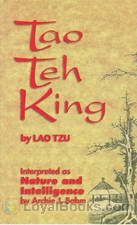 The Tao Teh King, or the Tao and its Characteristics
The Tao Teh King, or the Tao and its Characteristics
Written in classical Chinese some time during the sixth century BC, The Tao Teh King or The Tao and its Characteristics is a classical Chinese text that is one of the important keystones in understanding the thought systems of Asia. Though no clear records exist, it is traditionally thought to have been the work of the sage Lao Tzu, the founder of classical Taoism. He is reputed to have been a contemporary of Confucius, though this is also shrouded in mystery. However, many succeeding emperors and dynasties have claimed that he lived in their eras... | |
By: Lawrence Thomas Cole (1869-) | |
|---|---|
 The Basis of Early Christian Theism
The Basis of Early Christian Theism
| |
By: Leo Tolstoy (1828-1910) | |
|---|---|
 The Kingdom of God is within you
The Kingdom of God is within you
The title of the book comes from Luke 17:21. It is a non-fiction work of the famous Russian author Leo Tolstoy. He wrote it after many years of reflexion on Christianity and Jesus. Many subjects are present such as wars, non-violence, misunderstanding by believers of the faith, etc. | |
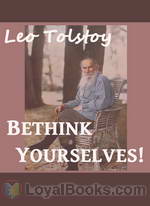 Bethink Yourselves!
Bethink Yourselves!
As Russia goes to war against Japan, Tolstoy urges those at all levels of society, from the Tsar down to the common soldier, to consider their actions in the light of Christ's teaching. "However strange this may appear, the most effective and certain deliverance of men from all the calamities which they inflict upon themselves and from the most dreadful of all—war—is attainable, not by any external general measures, but merely by that simple appeal to the consciousness of each separate man which, nineteen hundred years ago, was proposed by Jesus—that every man bethink himself, and ask himself, who is he, why he lives, and what he should and should not do... | |
By: Leslie Stephen (1832-1904) | |
|---|---|
 The English Utilitarians
The English Utilitarians
| |